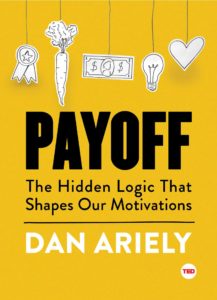ISBN: 1501120042 (ISBN13: 9781501120046)
Motivation is a topic of great interest to behaviour and organizational scientists who are generally looking for ways to improve performance and productivity. The subtitle of the book “Payoff” attracted my attention, whetting my curiosity with the promise of the hidden logic behind motivations. ‘Payoff’ is an engaging melange of research findings with personal stories and experiences, blended into an interesting read as much for a lay person as for a researcher. Catchy chapter headers also added to the appeal.
Dan begins with a dictionary definition of motivation and how it is a significant part of all aspects of our lives – personal and professional. In the author’s own words “This book explores the jungle of motivation’s true nature, as well as our blindness to its strangeness and complexity”. His introduction talks about an interesting theory that motivation is a sum of a number of factors suggesting the equation:
Motivation = Money + Achievement + Happiness + Purpose + A Sense of Progress + Retirement Security + Caring About Others + Your Legacy + Status + Number of Young Kids at Home2 + Pride + E + P + X + [All kinds of other elements]. He presents the complexity of the concept of motivation and how we tend to attribute it to different factors before a project and during the project. He also points out that often we become aware of the various factors affecting our motivation levels only after the negative effects are evident.
He then goes on to describe an experience that made him realise that what pushed him to come out of a tragic incident was the strong need to conquer a feeling of helplessness. The need to “reclaim even a tiny modicum of control over his life” was the motivation to endure the pain and to get better. With these words the author brings out the significance of experiencing meaning in life as against living an easy life.
Dan cites several interesting studies that he and his colleagues have conducted where performance of research participants as well as actual factory employees went up much more significantly when they were able to find meaning in their work than when their work was simply rewarded with monetary returns. In fact his research points to the fact that monetary rewards actually hampered rather than helped productivity whereas a simple word of acknowledgement from the superior worked wonders.
Through four easy to read chapters, Dan enlightens the readers on what kills motivation, how joy and finding meaning in work are significant, that money is a wrongly over-rated motivator and how often the need for finding meaning unconsciously extends to encompass even the afterlife. Dan concludes with the answer to the ultimate question alluding to the book The Hitchhiker’s Guide to the Galaxy by Douglas Adams.
Expressed in a light and humorous language, while the book reiterates what several other researchers have found in recent years, it also encourages the reader to ponder some of the simple yet often ignored aspects of leadership and motivation. It is a small book, quick to read and packed with wisdom.


